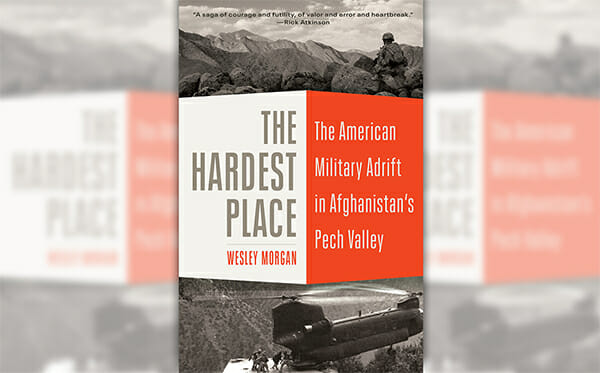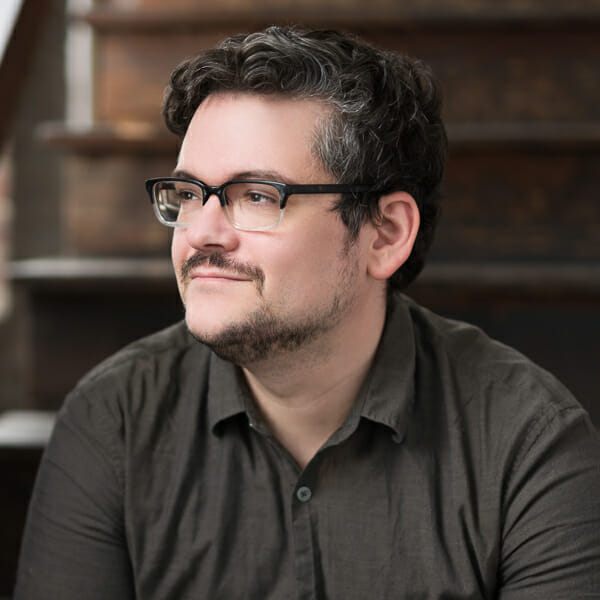Afghanistan from the Ground Up: Book Talk and Panel Discussion
Speaker:
Wesley Morgan
War Journalist and Author
Chris Doneski, Michael Garcia, John Rodriguez and Jessica Saenz
Afghanistan War Veterans
Thursday, December 2, 2021 | 12:15 - 1:30 pm | Crum Auditorium, Robert B. Rowling Hall


The Hardest Place: The American Military Adrift in Afghanistan’s Pech Valley
Wesley Morgan is a journalist who has covered the U.S. military and its wars in Afghanistan and Iraq since 2007. His reporting has appeared in Politico, the Washington Post, the New York Times, and other outlets. He is a graduate of Princeton University. You can follow him on Twitter at @wesleysmorgan.
When we think of the war in Afghanistan, chances are we’re thinking of a small, remote corner of the country where American military action has been concentrated: the Pech and its tributary valleys in Kunar and Nuristan provinces. The rugged, steep terrain and thick forests made the region a natural hiding spot for targets in the American war on terror, from Osama bin Laden to the Islamic State, and it has been the site of constant U.S. military activity for nearly two decades. Even as the U.S. presence in Afghanistan transitioned to a drone war, the Pech remained at the center of it, a testbed for a new method of remote warfare.
Wesley Morgan first visited the Pech in 2010, while he was still a college student embedding with military units as a freelancer. By then, the Pech and its infamous tributary the Korengal had become emblematic of the war, but Morgan found that few of the troops fighting there could explain why their remote outposts had been built. In The Hardest Place, he unravels the history those troops didn’t know, captures the culture and reality of the war through both American and Afghan eyes, and reports on the snowballing American missteps that made each unit’s job harder than the last as storied outfits like Marines, paratroopers, Rangers, Green Berets, and SEALs all took their turn.
Through reporting trips, hundreds of interviews with Americans and Afghans, and documentary research, Morgan writes vividly of large-scale missions gone awry, years-long hunts for single individuals, and the soldiers, Marines, commandos, and intelligence operatives who cycle through, along with several who return again and again to the same slowly evolving fight.
Veteran Reflections on the War in Kunar, Nuristan, and Nangarhar
 Chris Doneski is the Director at Army Futures Command Programs, BAE Systems. Chris served 27 years in the US Army. As an Armor officer, he served in Armor, Cavalry, and Airborne Infantry units. His assignments included several years at the Combat Training Centers (NTC & JMRC), III Corps and Ft Hood, and Germany. He has deployed in operational assignments from Assistant S3, Squadron Executive Officer, and Brigade Chief of Operations. Prior to retiring, Chris served as Deputy Chief of Staff of III Corps and deployed as Deputy Director of Operations for CJTF-OIR synchronizing the fight against ISIS. Chris earned a Bachelor’s degree from Caldwell College, an MBA from the University of Maryland, and a Masters of Strategic Studies from the US Army War College. After retiring from the Army in 2017, he was a consultant in Austin, co-founder of the Texas Defense Innovation Forum (TDIF) which is a non-profit established to help educate and connect the defense establishment with the Texas innovation community. He currently works as Director of Army Programs with BAE Systems here in Austin. Here he coordinates with Army Futures Command understanding requirements to assist in the modernization of the US Army. He volunteers as VP and board member for the Texas Capital Region AUSA Chapter, as board member of the Texas Military Officers Association, and leads the Austin Defense Council. He lives in Georgetown with his wife, daughter, and three dogs.
Chris Doneski is the Director at Army Futures Command Programs, BAE Systems. Chris served 27 years in the US Army. As an Armor officer, he served in Armor, Cavalry, and Airborne Infantry units. His assignments included several years at the Combat Training Centers (NTC & JMRC), III Corps and Ft Hood, and Germany. He has deployed in operational assignments from Assistant S3, Squadron Executive Officer, and Brigade Chief of Operations. Prior to retiring, Chris served as Deputy Chief of Staff of III Corps and deployed as Deputy Director of Operations for CJTF-OIR synchronizing the fight against ISIS. Chris earned a Bachelor’s degree from Caldwell College, an MBA from the University of Maryland, and a Masters of Strategic Studies from the US Army War College. After retiring from the Army in 2017, he was a consultant in Austin, co-founder of the Texas Defense Innovation Forum (TDIF) which is a non-profit established to help educate and connect the defense establishment with the Texas innovation community. He currently works as Director of Army Programs with BAE Systems here in Austin. Here he coordinates with Army Futures Command understanding requirements to assist in the modernization of the US Army. He volunteers as VP and board member for the Texas Capital Region AUSA Chapter, as board member of the Texas Military Officers Association, and leads the Austin Defense Council. He lives in Georgetown with his wife, daughter, and three dogs.
 Michael Garcia is a first-year graduate student at the LBJ school for public affairs studying for a masters of global policy studies degree with a focus on international security, intelligence, and diplomacy. Originally from San Antonio, he joined the Army after high school and served 5 years in special operations as an intelligence analyst for the 75th Ranger Regiment. He served 3 deployments in Afghanistan operating as a targeting analyst and senior intelligence analyst. After leaving active duty, he continues to further his career in national security and intelligence in the 505th Army reserve. Initially at the University of Houston and after attending the University of Texas in San Antonio, Michael completed his undergraduate degree in Government with a security studies certificate from the Clements Center for national security at the University of Texas at Austin. While attending the University of Texas, he interned at the Texas Senate on the veteran affairs and border security committee under Senator Donna Campbell. He has focused his education on US/Russian international relations, intelligence studies, and asymmetrical security threats.
Michael Garcia is a first-year graduate student at the LBJ school for public affairs studying for a masters of global policy studies degree with a focus on international security, intelligence, and diplomacy. Originally from San Antonio, he joined the Army after high school and served 5 years in special operations as an intelligence analyst for the 75th Ranger Regiment. He served 3 deployments in Afghanistan operating as a targeting analyst and senior intelligence analyst. After leaving active duty, he continues to further his career in national security and intelligence in the 505th Army reserve. Initially at the University of Houston and after attending the University of Texas in San Antonio, Michael completed his undergraduate degree in Government with a security studies certificate from the Clements Center for national security at the University of Texas at Austin. While attending the University of Texas, he interned at the Texas Senate on the veteran affairs and border security committee under Senator Donna Campbell. He has focused his education on US/Russian international relations, intelligence studies, and asymmetrical security threats.
 John Rodriguez is a Lieutenant Colonel in the Maryland Army National Guard. Operational assignments include: information operations planner for the Cyber National Mission Force in 2020, director of information operations for Combined Joint Task Force – Horn of Africa from 2017 to 2018, and rifle platoon leader and company executive officer for Bravo Company, 1st Battalion, 26th Infantry Regiment in the Korengal Valley in Kunar Province, Afghanistan from 2008 to 2009. He holds a BA from Mount Saint Mary’s University and a MA from Georgetown University. He lives in Washington, DC with his wife Lorraine.
John Rodriguez is a Lieutenant Colonel in the Maryland Army National Guard. Operational assignments include: information operations planner for the Cyber National Mission Force in 2020, director of information operations for Combined Joint Task Force – Horn of Africa from 2017 to 2018, and rifle platoon leader and company executive officer for Bravo Company, 1st Battalion, 26th Infantry Regiment in the Korengal Valley in Kunar Province, Afghanistan from 2008 to 2009. He holds a BA from Mount Saint Mary’s University and a MA from Georgetown University. He lives in Washington, DC with his wife Lorraine.
 Jessica Saenz is a U.S. Army Combat Veteran, former Staff Sergeant and Human Intelligence (HUMINT) Collection team leader with over six years of military experience supporting Operation Enduring Freedom. This includes 27 months of direct combat deployment to Nuristan Province (2006-2007) and Logar Province (2009), Afghanistan. Jessica was decorated for her efforts as the first female US Army HUMINT collector to work in the mountainous Kamdesh District, Nuristan Province, creating the first reliable and ongoing source operations network in the midst of frequent combat engagements with enemy forces. In Logar Province, she led a four-Soldier HUMINT Collection team that excelled in HUMINT collection and reporting, far exceeding US Army Intelligence accepted norms, providing daily and timely intelligence for local US Commanders, Special Operations forces, and the Intelligence Community as a whole. Ms. Saenz was individually recognized for numerous missions in support of US Special Forces, providing on-objective detainee screening and civilian interviews leading to the positive identification of High Value Individuals. Upon ending active duty, she provided her experience and expertise to the Intelligence Community as a senior level instructor at Ft. Huachuca, AZ, for advanced level certification in military source operations. She received a B.S. in Criminal Justice from Texas State University, and M.A. in English from the University of Texas Permian Basin (UTPB). As an English Instructor, her credentials include four years of developing and teaching online and classroom curriculum for English Composition and Rhetoric courses at Midland College and UTPB. Ms. Saenz collaborated with the Green Zone Program at Midland College to equip faculty and staff with training to raise awareness regarding student veterans’ transition from the military to a college campus. She volunteered as the faculty mentor for Midland College’s Veterans Student Club and was the keynote guest speaker at the 2015 Midland College Veterans Day Ceremony. Since 2019, Ms. Saenz has been an Instructional Designer at Texas Tech University to provide online course development and support for undergraduate and graduate courses, and the TTU K-12 online program.
Jessica Saenz is a U.S. Army Combat Veteran, former Staff Sergeant and Human Intelligence (HUMINT) Collection team leader with over six years of military experience supporting Operation Enduring Freedom. This includes 27 months of direct combat deployment to Nuristan Province (2006-2007) and Logar Province (2009), Afghanistan. Jessica was decorated for her efforts as the first female US Army HUMINT collector to work in the mountainous Kamdesh District, Nuristan Province, creating the first reliable and ongoing source operations network in the midst of frequent combat engagements with enemy forces. In Logar Province, she led a four-Soldier HUMINT Collection team that excelled in HUMINT collection and reporting, far exceeding US Army Intelligence accepted norms, providing daily and timely intelligence for local US Commanders, Special Operations forces, and the Intelligence Community as a whole. Ms. Saenz was individually recognized for numerous missions in support of US Special Forces, providing on-objective detainee screening and civilian interviews leading to the positive identification of High Value Individuals. Upon ending active duty, she provided her experience and expertise to the Intelligence Community as a senior level instructor at Ft. Huachuca, AZ, for advanced level certification in military source operations. She received a B.S. in Criminal Justice from Texas State University, and M.A. in English from the University of Texas Permian Basin (UTPB). As an English Instructor, her credentials include four years of developing and teaching online and classroom curriculum for English Composition and Rhetoric courses at Midland College and UTPB. Ms. Saenz collaborated with the Green Zone Program at Midland College to equip faculty and staff with training to raise awareness regarding student veterans’ transition from the military to a college campus. She volunteered as the faculty mentor for Midland College’s Veterans Student Club and was the keynote guest speaker at the 2015 Midland College Veterans Day Ceremony. Since 2019, Ms. Saenz has been an Instructional Designer at Texas Tech University to provide online course development and support for undergraduate and graduate courses, and the TTU K-12 online program.
REGISTRATION IS REQUIRED FOR ALL VIRTUAL AND IN-PERSON EVENTS
The Clements Center will continue to follow all public health related policies of the University of Texas. Please be mindful that an inherent risk of exposure to viruses and other health threats exists in any public space. Attendees voluntarily assume all associated risks. All UT guidelines and FAQs about COVID-19 can be found at Protect Texas Together.
For more information about this event, contact Elizabeth Doughtie at [email protected].




